Search
Search Results
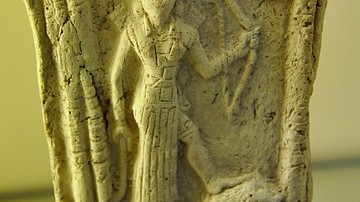
Definition
Ishtar
Ishtar (Inanna in Sumerian sources) is a primary Mesopotamian goddess closely associated with love and war. This powerful Mesopotamian goddess is the first known deity for which we have written evidence. While largely unknown in the modern...
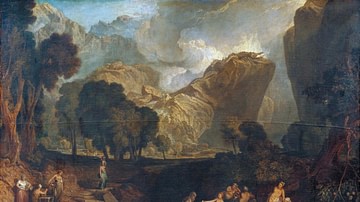
Image
The Goddess of Discord Choosing the Apple of Contention in the Garden of the Hesperides
The Goddess of Discord Choosing the Apple of Contention in the Garden of the Hesperides, oil on canvas by Joseph Mallord William Turner, 1806. In ancient Greek mythology, the Garden of the Hesperides was situated on the slopes of Mount Atlas...
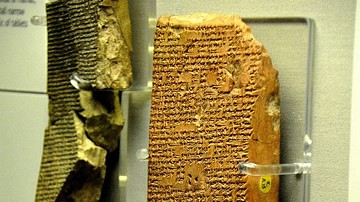
Image
Goddess Ishtar descent to the underworld tablet
The legend, written in Akkadian, describes how Ishtar, goddess of sexuality and warfare, went to the Underworld. Ishtar decided to undertake the journey, although the Underworld was known as the 'land of no return' for humans and gods alike...
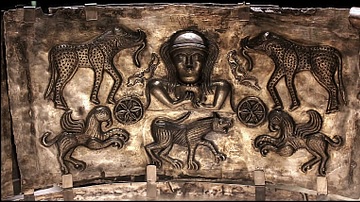
Image
Female Goddess, Gundestrup Cauldron
A panel from the Gundestrup Cauldron showing a female goddess with a wheel on either side of her. The figure may be Medb, a major Celtic goddess of territory, fertility and rulership. The figure is surrounded by exotic creatures which seem...
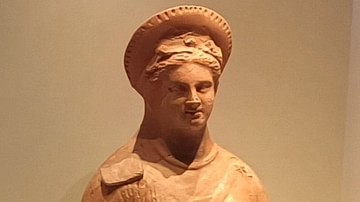
Image
Terracotta Bust of a Macedonian Goddess or Princess from Pella
Terracotta bust of a Macedonian goddess or princess from Pella, found in the Agora, dating from the 4th century BCE. Archaeological Museum of Pella. In stark contrast to the limited view of women offered in ancient writings about Macedonia...
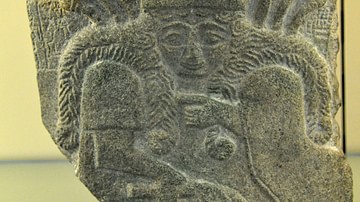
Image
Goddess Nisaba
A fragment of a vase with a depiction of the goddess Nisaba (also Ninibgal or Nidaba), goddess of writing, learning, and the harvest. The cuneiform inscription on the vase mentions the name of Entemena, ruler of Lagash. Chlorite. From Mesopotamia...
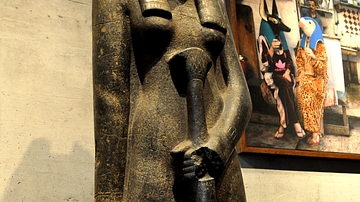
Image
Goddess Sekhmet Statue
Granite standing figure of goddess Sekhmet. From goddess Mut temple at Karnak, modern-day Egypt. New Kingdom, 19th Dynasty,circa 1250 BCE. (State Museum of Egyptian Art, Munich, Germany).
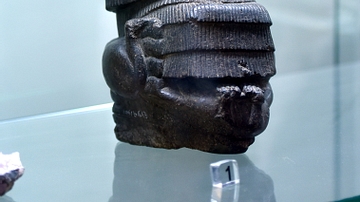
Image
Goddess Bau from Ur
Statue of a seated goddess, Bau (Nintinugga), from the Ningal Complex at the city of Ur, Iraq. Isin-Larsa period, c. 1800 BCE. Bau was the consort of the god Ninurta and the goddess of healing. On display the Iraq Museum in Baghdad, Republic...
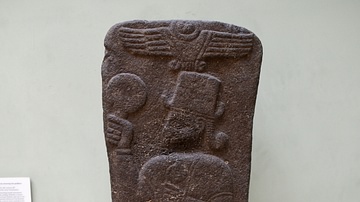
Image
Hittite Basalt Stela Showing Goddess Kubaba
The upper part is a freestanding basalt monument depicting the goddess Kubaba, consort of the storm god Teshub, and one of the most important deities at Carchemish. She holds a mirror and pomegranate, symbols of magic and fertility. Neo-Hittite...
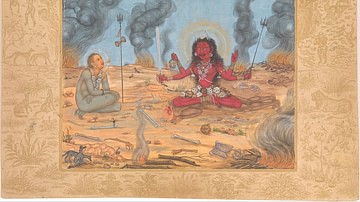
Image
The Goddess Bhairavi Devi with Shiva
A painting credited to Payag, a Mughal artist. The Hindu goddess Bhairavi, female counterpart to Shiva, is shown in demonic form. Beneath the goddess is a corpse. Bhairavi wears a skirt of human skulls and carries symbols of destruction...